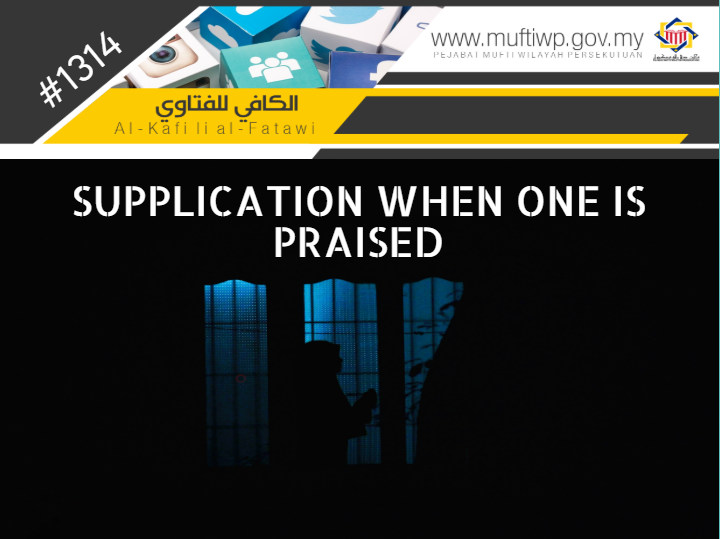Question:
Assalamualaikum SS Dato’ Seri Mufti. My friends would praise me all the time when I’m with them. Sometimes, I will feel proud for the compliments that I received. Is there a specific supplication taught to us by the Prophet PBUH that we could recite when we are praised?
Answer:
Alhamdulillah, praise and thanks to Allah for the countless blessings He has blessed us all with. Blessings and salutations to the Prophet Muhammad PBUH, his wives, his family, companions and all those that follow his teachings to the day of judgement.
First and foremost, it should be reminded that excessively praising someone in their presence is restricted by the Prophet Muhammad PBUH. [1]
There is a hadith narrated by Abu Bakrah R.Anh, where there was a person who praised another person in the presence of Allah's Apostle (ﷺ), whereupon he said:
وَيْحَكَ قَطَعْتَ عُنُقَ صَاحِبِكَ قَطَعْتَ عُنُقَ صَاحِبِكَ مِرَارًا إِذَا كَانَ أَحَدُكُمْ مَادِحًا صَاحِبَهُ لاَ مَحَالَةَ فَلْيَقُلْ أَحْسِبُ فُلاَنًا وَاللَّهُ حَسِيبُهُ وَلاَ أُزَكِّي عَلَى اللَّهِ أَحَدًا
“Woe be to thee, you have broken the neck of your friend, you have broken the neck of your friend-he said this twice. If one of you has to praise his friend at all, he should say: I think (him to be) so and Allah knows it well and I do not know the secret of the heart and Allah knows the destined end, and I cannot testify his purity against Allah but (he appears) to be so and so.”
Sahih Muslim (3000)
Moderate praising is not restricted, where it is even considered as good socializing skill among humans. However, the person who are praised has to be careful and protect himself from the feelings of riya’, ujub and takabbur when he hears the praises for him.
There is a great supplication of the companion of the Prophet PBUH, where it is narrated that Adi bin Arthah – rahimahullah – (a tabi’in scholar) narrated:
كَانَ الرَّجُلُ مِنْ أَصْحَابِ النَّبِيِّ صلى الله عليه وسلم إِذَا زُكِّيَ قَالَ: اللَّهُمَّ لاَ تُؤَاخِذْنِي بِمَا يَقُولُونَ، وَاغْفِرْ لِي مَا لا يَعْلَمُونَ
“When one of the Companions of the Prophet, may Allah bless him and grant him peace, was praised, he said in supplication to Allah), 'Do not take me to task for what they say and forgive me for what they do not know.”
Sahih al-Bukhari in al-Adab al-Mufrad (761)
There is also a narration from some salaf scholars that suggest the following supplication:
اللهُمَّ أَنْتَ أَعْلَمُ بِي مِنْ نَفْسِي، وَأَنَا أَعْلَمُ بِنَفْسِي مِنَ النَّاسِ، اللهُمَّ لَا تُؤَاخِذْنِي بِمَا يَقُولُونَ، وَاغْفِرْ لِي مَا لَا يَعْلَمُونَ
“O Allah, indeed You are the All-Knowing regarding the matters of myself more than me, and I know myself more than others know about me. O Allah, do not take me to task for what they say and forgive me for what they do not know. And make me better than the judgement of them towards me.”
In another narration, there is the addition of the phrase:
وَاجْعَلْنِي خَيْرًا مِمَّا يَظُنُّونَ
“Make me better than what they think of me.”
Narrated by al-Baihaqi in Syua’ab al-Iman (4524 and 4534)
The above supplication is in accordance with the statement of Allah SWT:
فَلَا تُزَكُّوا أَنْفُسَكُمْ هُوَ أَعْلَمُ بِمَنِ اتَّقَى
“So do not claim yourselves to be pure; He is most knowing of who fears Him.”
Surah al-Najm (32)
Sufyan bin Uyainah once said,
قالت العلماء المدح لا يغر من عرف نفسه
“The scholars stated: praises will not mislead someone who knows himself (he’s well aware of himself and realize his many mistakes and sins).” (Refer Hilyatul Auliya’ 7/302)
Wallahua’lam.
End Notes:
[1] Refer our previous articles regarding excessive praise through the link: https://muftiwp.gov.my/ms/artikel/al-kafi-li-al-fatawi/2205-al-kafi-683-hukum-memuji-secara-berlebihan


